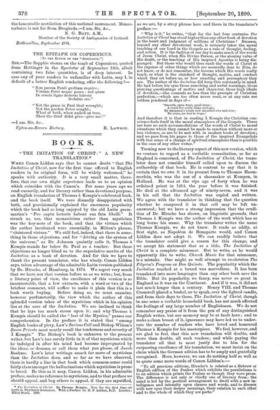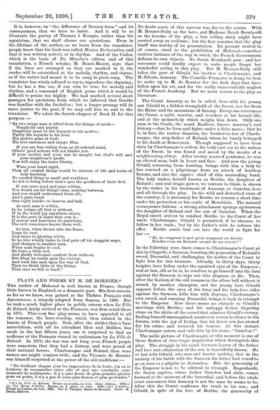BOOKS.
"THE IMITATION OF CHRIST : " A NEW TRANSLATION.*
WHEN Canon Liddon says that he cannot doubt "that The Imitation of Christ, now for the first time offered to English readers in its original form, will be widely welcomed," he speaks with authority. It is a very small matter, there- fore, that our own slight experience leads us to an opinion which coincides with the Canon's. For some years ago we read cursorily, and for literary rather than devotional purpose, an English translation of Thomas a Kempis's celebrated book, and the book itself. We were dismally disappointed with both, and provisionally explained the enormous popularity which the book had so long enjoyed by the old Latin gram- marian's "Pro captu lectoris habent sua fata libelli." It struck us, too, that monasticism rather than mysticism was the key-note of the book, and that the virtues which the author inculcated were essentially, in Milton's phrase, "cloistered virtues." We still feel, indeed, that there is some- thing in these objections, and for "driving on the system of the universe," as Dr. Johnson quaintly calls it, Thomas a Kempis stands far below St. Paul as a teacher. But these objections no longer blind us to the superlative merits of the Imitation as a book of devotion. And for this we have to thank the present translator, who has wisely, Canon Indon says, taken advantage of the admirable Latin version published by Dr. Hirsche, of Hamburg, in 1874. We regret very ranch that we have not that version before us as we write ; but, from a literary point of view, the excellence of this version is so incontestable, that a few extracts, with a word or two of the briefest comment, will suffice to make it plain that this is a book worth buying. Before doing so, we must examine, however perfunctorily, the view which the author of this splendid version takes of the mysticism which in his opinion lies at the core of the Imitation. We are inclined to think that he lays too much stress upon it; and why Thomas a Kempis should be called the "last of the Mystics," passes our comprehension. In the preface it is stated that "among English books of piety, Law's Serious Call and Bishop Wilson's Sacra Privata most nearly recall the tenderness and severity of A Kempis." The Bishop's book is unknown to the present writer, but Law's has surely little in it of that mysticism which he indulged in after his mind had become impregnated by the ideas, or dreams, or call them what you please, of Jacob Boehme. Law's later writings smack far more of mysticism than the Imitation does, and so far as we have observed, there is hardly a line in that book which common-sense could fairly class amongst the hallucinations which mysticism is prone to breed. Be this as it may, Canon Liddon, in his admirable preface, makes no reference to mysticism, and to that preface we should appeal, and beg others to appeal, if they are mystified, • The Imitation of Christ. By Thomas Kempis. Now for the first time set forth in Rhythmic Sentences, With a Preface by H. P Liddon, D.D. London: Elliot Stock. 1889.
as we are, by a stray phrase here and there in the translator's preface :—
" Why is it," he writes, "that for the last four centuries The Imitation of Christ has stood higher than any other book of devotion in the heart and judgment of millions of Christians ? Because, beyond any other devotional work, it seriously takes the moral teaching of our Lord in the Gospels as a rule of thought, feeling, and action. It is the fashion of our day to make much of the words of Jesus Christ, when His Divine Person, or the atoning value of His death, or the teaching of His inspired Apostles is being dis- paraged. But those who would thus exalt the words of Christ at the expense of other things which are assuredly dear to Him, do not know, or do not remember, the lessons which His words really teach, or what is the standard of thought, motive, and conduct which they set before us, or how exacting and peremptory they are. The author of the Imitation did keep this constantly in mind. He had before his eyes those searching and awful warnings, those piercing questionings of motive and character, those high ideals of devotion,—the counsels no less than the precepts of Christian perfection,—which are too often never read, or at any rate are seldom pondered in days of— 'Smooth, open ways, good store; A creed for every clime and age,
By mammon's touch new moulded o'er and o'er ; No cross, no war to wage.'
And therefore it is that in reading A Kempis the Christian con- science feels itself in the moral atmosphere of the Gospels. There are here no such accommodations of the words of Christ to moral situations which they cannot be made to sanction without more or less violence, as are to be met with in modern books of devotion; and we pass from his pages to those of the inspired Evangelists with less sense of a change of spiritual atmosphere than is possible in the case of any other writer.'
Turning now to the literary aspect of this new version, which we venture to regard as a veritable resuscitation, so far as England is concerned, of The Imitation of Christ, the trans- lator does not consider himself called upon to discuss the authorship of that book. He is content to say that it is certain that we owe it in its present form to Thomas Haem.- merlein, who was the son of a shoemaker at Kempen, in
Holland. He was at the ripe age of forty when he was ordained priest in 1414, the year before it was finished. He died at the advanced age of ninety-seven, and it was in his cell that the Imitation was copied and written.
We agree with the translator in thinking that the question whether he composed it in that cell may be left un- answered; but we have a strong impression that the erudi- tion of Dr. Hirsche has shown, on linguistic grounds, that Thomas a, Kempis was the author of the work which has so long borne his name. Why the translator writes the name Thomas Kempis, we do not know. It reads as oddly, at first sight, as Napoleon de Bonaparte would, and Canon Liddon does not adopt it. We can readily believe that the translator could give a reason for this change, and we accept his statement that as a title, The Imitation of Christ is a complete misnomer. But to write, as he would apparently like to write, Church _Music for that misnomer, is a mistake. One might as well attempt to re-christen The Pilgrim's Progress or Don Quixote. The popularity which the Imitation reached at a bound was marvellous. It has been translated into more languages than any other book save the Bible. But its popularity, we fancy, was never so great in England as it was on the Continent. And if it was, it did not last much longer than a century. Henry VIII. and Thomas Cromwell placed a bushel, so to speak, over the lighted candle, and from their days to these, The limitation of Christ, though in one sense a veritable household book, has not much affected the feelings of any large number of Englishmen. We do not remember any praise of it from the pen of any distinguished English writer, but our memory may be at fault here ; and to make a clean breast of it, ignorance may have led us to under- rate the number of readers who have loved and honoured Thomas a Kempis for his masterpiece. We feel, however, and are glad to feel, that this new translation will double, and more than double, all such readers; and while paying the translator all that is most justly due to him for the surpassing excellence of his translation, we must insist on the claim which the German edition has to be amply and gratefully recognised. Here, however, we can do nothing half so well as to quote some more words of Canon Liddon's
"To all previous editions, Hirsche's is related as a Hebrew or English edition of the Psalter which exhibits the parallelisms is to an edition which prints the Psalms as though they were prose. The difference is not only or chiefly one of literary form; the mind is led by the poetical arrangement to dwell with a new in- telligence and intensity upon clauses and words, and to discern with new eyes their deeper meanings, their relation to each other and to the whole of which they are parts."
It is, however, on "the difference of literary form" and its consequences, that we have to insist. And it will be to illustrate the poetry of Thomas 1 Kempis, rather than his mysticism, that we shall choose our quotations. Even in the lifetime of the author, as we learn from the translator, people knew that his book was called Music(' Beclesiastica, and that it was written metric, or in rhythm. And of the Codex, which is the basis of Dr. Hirsche's edition and of this translation, a French scholar, M. Bonet-Manry, says that if the lines are arranged as they are marked in it, the reader will be astonished at the melody, rhythm, and rhyme, as if the writer had meant it to be sung in plain-song. The translator has wisely refused to try to reproduce the rhyming; but he has a fine ear, if our own be true, for melody and rhythm, and a command of English prose which it would be difficult to praise too highly. We had marked several short passages for quotation, from which we inferred that Goethe was familiar with the Imitation ; but a longer passage will do more justice to the poet, if we may call him so, and to the translator. We select the fourth chapter of Book II. for this purpose :—
" By two wings man is lifted from the things of earth—
Simplicity and purity.
Simplicity must be the keynote to his motive ; Purity the keynote to his love.
His motive aims at God; His love embraces and enjoys Him.
If you are free within from an ill-ordered mind,
Others' good actions will not hinder you. If your motive and your aim be naught but God's will and your neighbour's profit, You will enjoy the inner liberty.
Were your heart right, Then all created things would be mirrors of life and books of holy teaching.
No created thing so small and worthless As not to bring before men's eyes the goodness of their God.
If you were good and pure within, You would see all things clear, nothing between, And you would understand them all; And a pure heart Sees right inside—to heaven and hell.
As each man is within, So he judges all that is without. If in the world joy anywhere exists, It is the pure in heart that own it; If sorrow and heaviness be anywhere, The evil conscience knows them well.
As iron, when thrust into the flame, Loses its rust, And turns to glowing white, So he who wholly turns to God puts off his sluggish ways, And changes to another man.
When man begins to cool, He fears a little toil,
And gladly welcomes comfort from without.
But when we really gain the victory, And walk like men upon the way of God, Then we think little of the things That once we felt so hard."



































 Previous page
Previous page